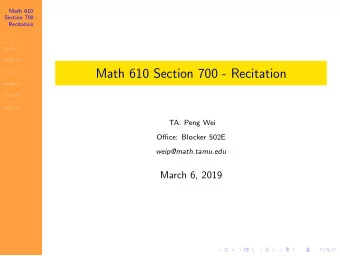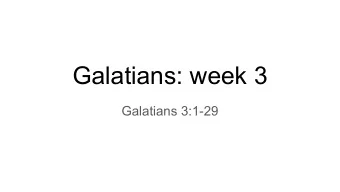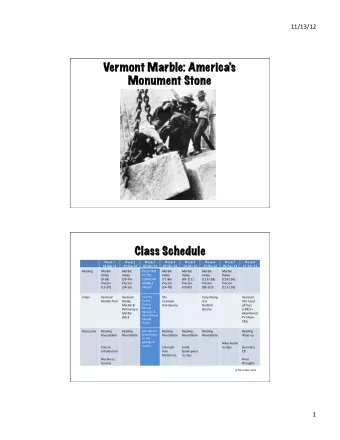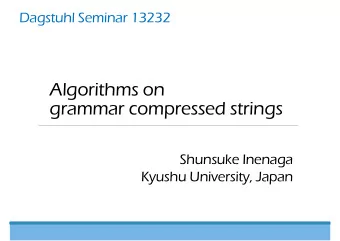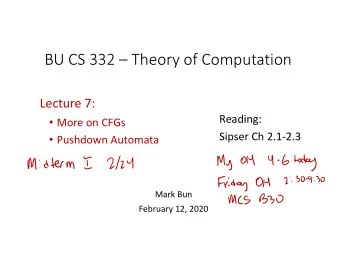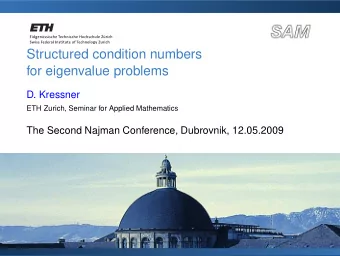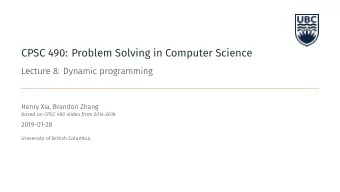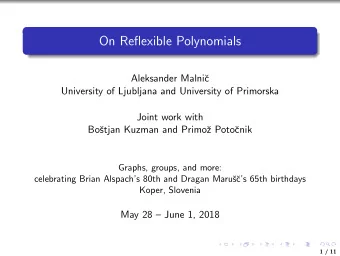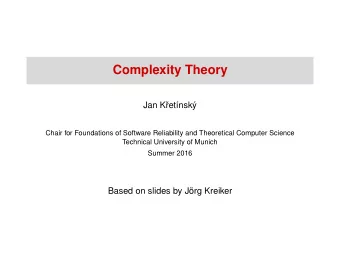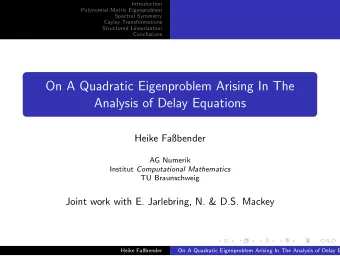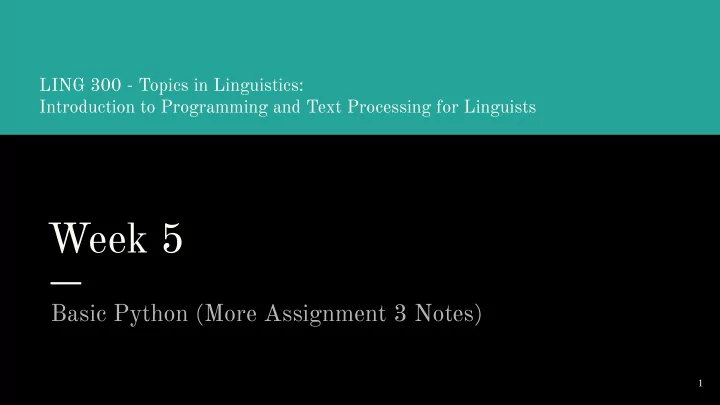
Week 5 Basic Python (More Assignment 3 Notes) 1 Later this Week - PowerPoint PPT Presentation
LING 300 - Topics in Linguistics: Introduction to Programming and Text Processing for Linguists Week 5 Basic Python (More Assignment 3 Notes) 1 Later this Week Survey: Midterm self-evaluations Midterm course feedback Final
LING 300 - Topics in Linguistics: Introduction to Programming and Text Processing for Linguists Week 5 Basic Python (More Assignment 3 Notes) 1
Later this Week ● Survey: ○ Midterm self-evaluations ○ Midterm course feedback ○ Final project ideas? ● Final project note: ○ Now there will be a default assignment ○ But it will be much more self-directed than usual 2
Notes from Assignment 3 All Assignment 3s graded on Quest, [netid]/week3/assignment_graded.py In-line comments as usual: ### [RV] Blah blah blah 3
Notes from Assignment 3 ● Department[1532:] ? ● and (boolean ‘and’) vs. & (bitwise ‘and’) - my bad! ○ Use and for boolean comparisons (short circuiting ✔ ) ○ & also has higher precedence (can be confusing) ● for line in open(f) Does not strip whitespace! ○ If you got 5-letter palindromes using min_length, this is because each line has ‘\n’ on the end! 4
Notes from Assignment 3 ● There’s a near-infinite variety of ways to do most things. ● Example: reverse_string ○ s[::-1] ○ l = list(s), while len(l) > 0, l.pop() ○ l = list(s), l.reverse(), ' '.join(l) ○ i = len(s) - 1, while i > 0, i -= 1 ○ new_s = '', for c in s, new_s = c + new_s 5
Notes from Assignment 3 ● Efficiency: not a huge deal for now, but be aware! e.g. consider how many times we loop over what Which is better? for word in s.split(): vs. for word in stopwords: if word in stopwords: if word in s.split(): ● Anti-corollary: “Don’t optimize prematurely” Doing it whichever way is fine, until it gets too slow to work 6
Style Notes from Assignment 3 ● Standards? Somewhat, e.g. style guide: https://www.python.org/dev/peps/pep-0008/ ● Opinions? Many! ● Key consideration is readability. ○ Other people may have to read your code ○ You may have to read your own code in five years 7
Style Notes from Assignment 3 ● Readability Basics: ○ # comments are good practice to explain the # purpose and functionality of more # complicated bits ○ The best code is also somewhat “self-documenting” ○ Variable names are a form of comment ○ Logical decomposition helps readability 8
Style Notes from Assignment 3 ● Consider: a = sum(vals) b = len(vals) vs. return sum(vals)/len(vals) return a/b length1 = len(s1) length2 = len(s2) vs. if len(s1) > len(s2): if length1 > length2: ... ... 9
Style Notes from Assignment 3 (cont.) ● Variable naming: try not to overload (one name does one thing) document = open(f) # file object document = document.read() # string document = letters_only(document) # string document = document.split() # list vs. document = open(f) # file object text = letters_only(document.read()) # string words = document.split() # list 10
Style Notes from Assignment 3 (cont.) ● Variable naming: try not to overload (one name does one thing) ○ Special case of this: .join() output = ' ' output = output.join(words) ○ Both ‘ output ’s are strings, but they’re different - first is the delimiter, second is the actual output. Just do: ✔ output = ' '.join(words) 11
Advanced Syntactic Sugar ● List Comprehension output = ' '.join([c for c in s if c.isalpha()]) ● Ternary Conditional Assignment x = 0 if random.random() > 0.3 else 1 ● Step slicing: my_string[start:end:step] 12
Recommend
More recommend
Explore More Topics
Stay informed with curated content and fresh updates.


